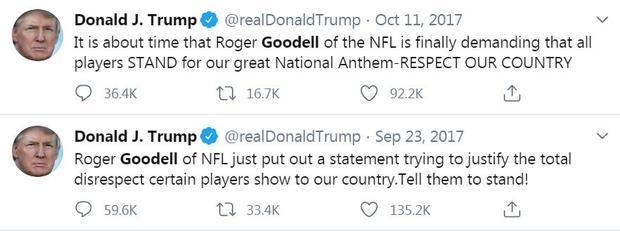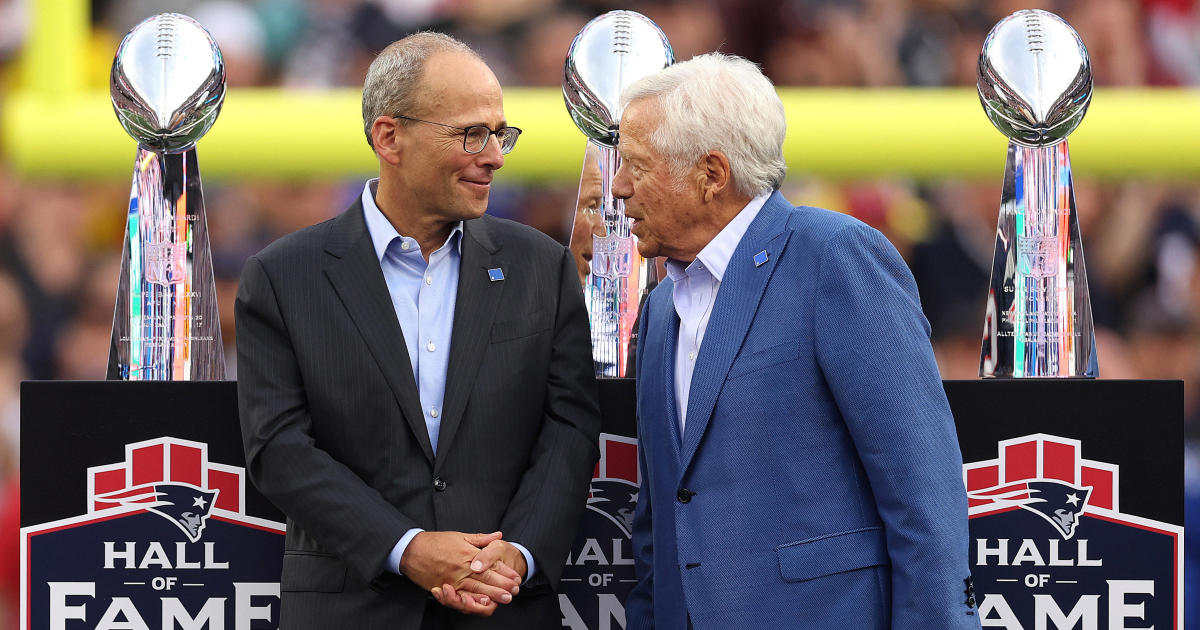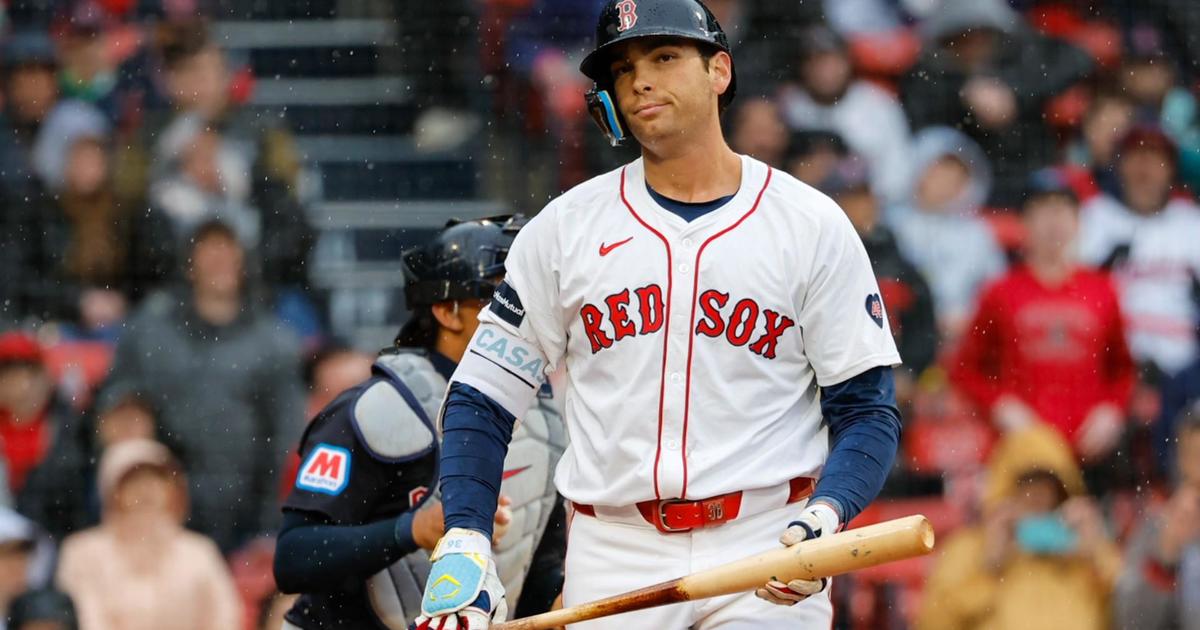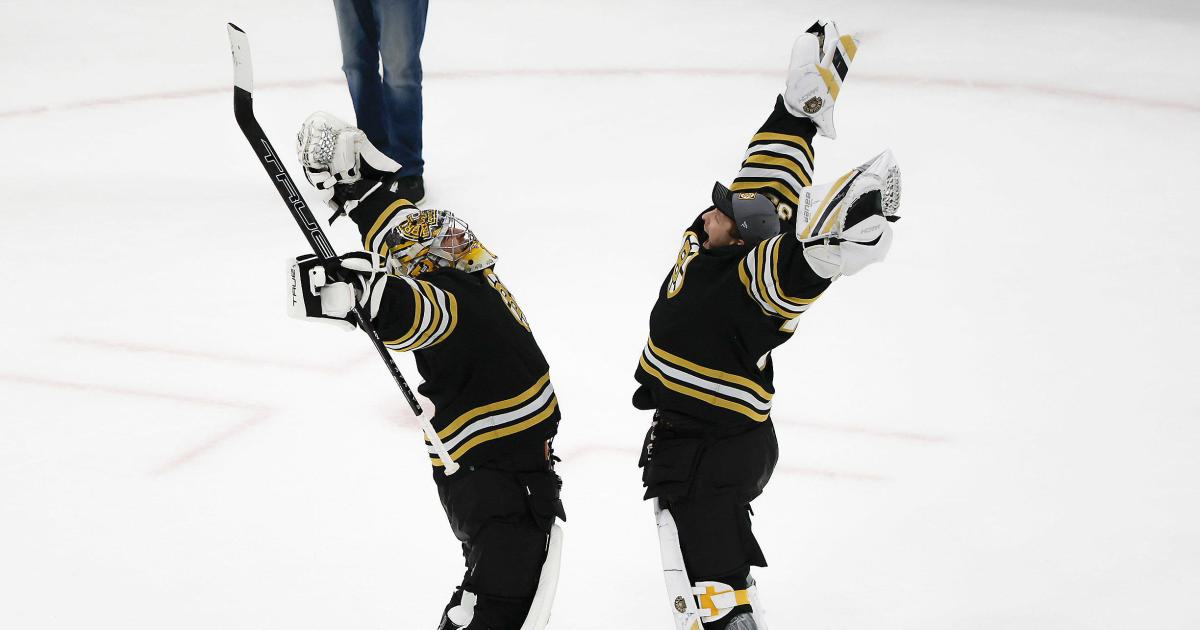A Donald Trump-Roger Goodell Fight Over NFL National Anthem Protests Appears To Be Brewing
By Michael Hurley, CBS Boston
BOSTON (CBS) -- Donald Trump played a critical role in reviving national anthem protests in the NFL -- a practice that had grown almost completely dormant -- when he made public, critical comments about any players kneeling during the playing of the national anthem.
Two years later, the president is unsurprisingly at the center of the national discussion regarding the potential for anthem protests. And he appears intent on playing the same role.
A few minutes shy of midnight on Sunday evening, Trump sent out a tweet reinforcing his message that players kneeling during the anthem are disrespecting the American flag. The president's tweet tiptoed into the territory of criticizing NFL commissioner Roger Goodell, who said Friday that he and the NFL were wrong to not listen to players express their societal concerns in previous years.
"Could it be even remotely possible that in Roger Goodell's rather interesting statement of peace and reconciliation, he was intimating that it would now be O.K. for the players to KNEEL, or not to stand, for the National Anthem, thereby disrespecting our Country & our Flag?" Trump tweeted.
Combine Trump's tweet with reports like these ...
... and it's clear that a political hurricane is brewing, with the NFL sitting directly in the eye of the storm.
That Trump's tweet came two days after Goodell's statement and two days after quarterback Drew Brees addressed the president directly was somewhat surprising. That Trump's tweet came just minutes before he quote-tweeted a fake account pretending to be an Amazon warehouse robot does make the delivery a bit peculiar.
Nevertheless, it is likely the first of many comments directed at the NFL, particularly as more and more players stand up and speak out against racial injustices in America.
Back in September of 2017, Trump delivered an impassioned speech in Alabama, in which he argued that players who kneel during the national anthem deserve to lose their jobs.
"Wouldn't you love to see one of these NFL owners, when somebody disrespects our flag, to say, 'Get that son of a bitch off the field right now'?" Trump said. "Out -- he's fired. He's fired!' ... Some owner is going to do that. He's going to say, 'That guy that disrespects our flag, he's fired.' And that owner, they don't know it -- they're friends of mine, many of them -- they don't know it, they'll be the most popular person for a week. They'll be the most popular person in this country. Because that's a total disrespect of our heritage, that's a total disrespect of everything that we stand for, OK? Everything that we stand for."
Also in 2017, Trump used his Twitter account to urge Goodell to put an end to kneeling in the NFL.
Putting aside Trump seemingly flouting his own strict rules for national anthem respect this past February, the attack against players for disrespecting the flag perpetuates a misunderstanding -- intentional, incidental, or otherwise -- of the message behind the protest.
"The media painted this as I'm anti-American, anti-men and women of the military, and that's not the case at all," Kaepernick said in September 2016. "I realize that men and women of the military go out and sacrifice their lives and put themselves in harm's way for my freedom of speech and my freedoms in this country, and my freedom to take a seat or take a knee. So I have the utmost respect for them. ... The message is we have a lot of issues in this country that we need to deal with. We have a lot of people that are oppressed. We have a lot of people that aren't treated equal, given equal opportunities. Police brutality is a huge thing that needs to be addressed. There are a lot of issues that need to be talked about, to be brought to life, and we need to fix those."
Kaepernick responded directly to criticism from Trump that month, too.
"It's a very ignorant statement that, if you don't agree with what's going on, hearing that justice and liberty and freedom for all, that you should leave the country," Kaepernick said of the then-presidential candidate. "He always says, 'Make America great again.' Well, America has never been great for people of color. That's something that needs to be addressed. Let's make America great for the first time."
Critics who characterized the protests as an affront to military members past and present often disregarded the fact that former Green Beret Nate Boyer helped Kaepernick decide upon taking a knee instead of sitting down during the national anthem.
"Soldiers take a knee in front of a fallen brother's grave, to show respect. When we're on a patrol, and we go into a security halt, we take a knee and we pull security," Boyer explained at the time.
Many explanations from players were overlooked, such as Brandin Cooks, who took a knee as a member of the Patriots in 2018, following Trump's "son of a bitch" statement.
"To be honest, it's just one of those things that you want to stand with your brothers, in a sense. Kneel with your brothers and be by their side," Cooks said. "One statement I would just like to make, a lot of people think we're disrespecting the flag and the military, but my father was a Marine, my uncle was a Marine, my family fought in the Vietnam War. I have the utmost respect for the men and women that fight for our freedom. And so that's the first statement I want to make. And quite frankly, I feel [conflicted] in a sense, because I have no courage to be able to do something like that. So I understand the magnitude that they're fighting across the world for our freedom. So that's not the message we're sending. The message is we just want respect and unity, and there's only so many ways that you can do it."
Despite hundreds of players sharing similar explanations, the criticism remained and still continues.
Over the weekend, Ben Carson -- a member of Trump's cabinet -- said that all kneeling players should just state their love of their country, and all will be forgiven.
"My personal feeling is if those players were to come out and say, 'We love our nation, we are patriots, we love our flag, we honor the memory of those who died to give us our freedom, but we are protesting some of the brutality that has occurred, and that's why we're doing this,' I think it would solve the problem," Carson said on CNN. "And I suggest that they do that."
Of course, in addition to the aforementioned statements, a pro-American message has accompanied most if not all of protesters' messages, including Kaepernick when it all began.
"I'm not anti-American," Kaepernick said in September 2016. "I love America."
Kaepernick accompanied that message with a pledge of $1 million to help community organizations aimed at improving the lives of those in need of some assistance in various areas. He ended up donating money to 22 different organizations, while also generating large donations from celebrities and athletes.
Nevertheless, the anti-American tag stuck and remains. It's why Drew Brees faced backlash last week for commenting that he "will never agree with anybody disrespecting the flag of the United States of America or our country." Brees faced a swift and harsh reaction from teammates and non-teammates around the NFL, leading him to issue not one but two apologies the next day.
Trump later tweeted his support of Brees' original message, while expressing disappointment that Brees apologized.
Brees -- who's drawn praise from the president in past years for his play on the field -- opted to push back against Trump.
"I realize this is not an issue about the American flag. It has never been. We can no longer use the flag to turn people away or distract them from the real issues that face our black communities," Brees said in a message directed at the president. "We must stop talking about the flag and shift our attention to the real issues of systemic racial injustice, economic oppression, police brutality, and judicial and prison reform. We are at a critical juncture in our nation's history! If not now, then when?"
Quite clearly, the issue is nuanced and layered, and it always has been. Just as clearly, the protests have been used as political ammunition when necessary, even if doing so meant overlooking some clear and straightforward explanations for why the protests were taking place at all.
With the country hurtling toward what will surely be another volatile presidential election cycle during what appears to be the most significant social movement in decades, and with the NFL seemingly attempting to turn a corner with its public position on player protests, Trump's late-night tweet on Sunday surely will not be the final time these two entities collide in 2020.
You can email Michael Hurley or find him on Twitter @michaelFhurley.




